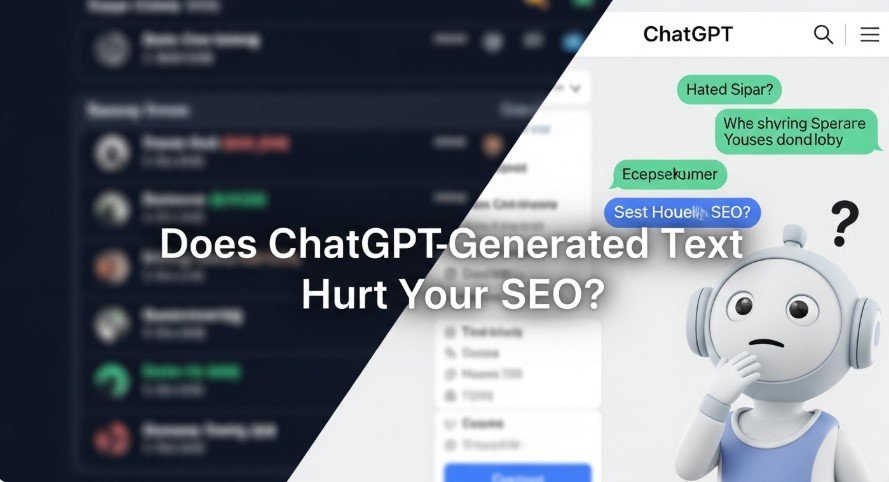In today’s digital landscape, creating high-quality content is essential for standing out online. Tools like ChatGPT, developed by OpenAI, have made content creation faster and more accessible. But a critical question looms for website owners and marketers: does using ChatGPT-generated text hurt your SEO rankings?
Understanding SEO and Content Quality
Search Engine Optimization (SEO) is the process of improving a website’s visibility on search engines like Google. High-quality content is at the heart of SEO success. Google’s algorithms prioritize content that is:
- Original: Unique and not duplicated across the web.
- Helpful: Addresses user needs and provides value.
- Relevant: Matches the user’s search intent.
- Aligned with E-E-A-T: Demonstrates Expertise, Experience, Authoritativeness, and Trustworthiness, especially for sensitive topics like health or finance.
Low-quality content, such as thin or repetitive text, can lead to lower rankings or penalties. This applies to all content, whether written by humans or AI.
What Is ChatGPT and How Does It Work?
ChatGPT is an AI language model created by OpenAI, built on advanced architectures like GPT-3.5 and GPT-4. It generates human-like text based on user prompts, making it a powerful tool for drafting blog posts, articles, or even social media content. Its strengths include speed and the ability to produce large volumes of text, but it has limitations, such as potential inaccuracies or lack of real-time data.
Does ChatGPT-Generated Text Hurt SEO?
The impact of ChatGPT-generated text on SEO depends on how it’s used. Google has stated that it does not penalize content based on its production method—whether human or AI-generated . Instead, it focuses on content quality. However, there are risks associated with unedited or poorly managed AI content that could harm your SEO:
| Risk | Description | Impact on SEO |
|---|---|---|
| Lack of Originality | AI may produce generic or similar text to existing content, risking duplicate content issues. | Google may deprioritize or penalize duplicate content, lowering rankings. |
| Inaccuracy | ChatGPT can generate factually incorrect information due to its reliance on training data patterns. | Inaccurate content damages credibility and trust, key E-E-A-T factors. |
| Thin Content | AI-generated text may lack depth or fail to fully address user intent. | Google classifies shallow content as “thin,” which can hurt rankings. |
| Over-Optimization | Forcing keywords into AI text can appear spammy. | Triggers Google’s spam filters, leading to penalties. |
| Lack of E-E-A-T | AI content may not convey expertise or authoritativeness, especially for sensitive topics. | Fails to meet Google’s quality standards, impacting rankings. |
| Lower User Engagement | Generic or impersonal AI text may lead to shorter page visits or higher bounce rates. | Poor engagement metrics can indirectly lower SEO performance. |
These risks highlight the importance of careful management when using AI-generated content.
Best Practices for Using ChatGPT in SEO
To leverage ChatGPT without harming your SEO, follow these actionable strategies:
- Use as a Starting Point: Use ChatGPT to generate ideas, outlines, or rough drafts. This saves time while allowing you to refine the content.
- Edit and Fact-Check: Always review AI-generated text for accuracy and relevance. Verify facts, especially for data or statistics, as ChatGPT may produce outdated or incorrect information.
- Add Original Insights: Incorporate your unique perspective, personal experiences, or exclusive data to differentiate your content. For example, share case studies or industry-specific insights.
- Maintain a Human Touch: Ensure the content reflects your brand’s voice and resonates with your audience. A human editor can enhance tone and engagement.
- Avoid Keyword Stuffing: Use keywords naturally to align with user intent, not to game the system. Google rewards organic, reader-focused content.
- Check for Duplicates: Use plagiarism detection tools to ensure your content is unique, even if based on an AI draft.
- Update Regularly: Refresh AI-generated content to keep it relevant, especially for time-sensitive topics.
By following these practices, you can harness ChatGPT’s efficiency while meeting Google’s quality standards.
Google’s Stance on AI-Generated Content
Google’s position is clear: it prioritizes content quality over how it’s created. In a February 2023 blog post, Google emphasized that its ranking systems reward content that aligns with E-E-A-T, regardless of whether it’s AI- or human-generated . However, Google’s algorithms are increasingly adept at detecting low-quality or repetitive content, which could include unedited AI text. This underscores the need for human oversight to ensure content meets high standards.
People Also Ask: Addressing Common Questions
Based on Google’s “People Also Ask” and “Related Searches” sections, here are answers to common questions about ChatGPT and SEO:
Can Google detect AI-generated content?
Google’s algorithms focus on content quality, not specific AI detection. However, patterns in unedited AI text, such as repetitive phrasing, may signal low quality, indirectly affecting rankings.
Is AI content bad for SEO?
Not inherently, but unedited or generic AI content can harm SEO due to lack of originality or depth.
How can I use ChatGPT for SEO without penalties?
Use it for ideation or drafts, then edit thoroughly, fact-check, and add unique value to align with E-E-A-T.
Does AI content rank well?
It can rank well if it’s high-quality, original, and user-focused, just like human-written content.
The Future of AI in SEO
As AI technology advances, tools like ChatGPT will likely become more sophisticated, potentially offering better alignment with user intent and real-time data integration. However, human expertise will remain critical for ensuring content meets E-E-A-T standards and resonates with audiences. The future of SEO will likely involve a hybrid approach, combining AI efficiency with human creativity to produce high-quality, engaging content.
Final Thoughts
AI tools like ChatGPT are reshaping content creation, offering speed and scalability. However, SEO success depends on delivering value to your audience. By prioritizing quality, originality, and user intent, you can use ChatGPT to enhance your content strategy without risking your search rankings. Stay informed about Google’s guidelines and adapt your approach to maintain a strong online presence.
